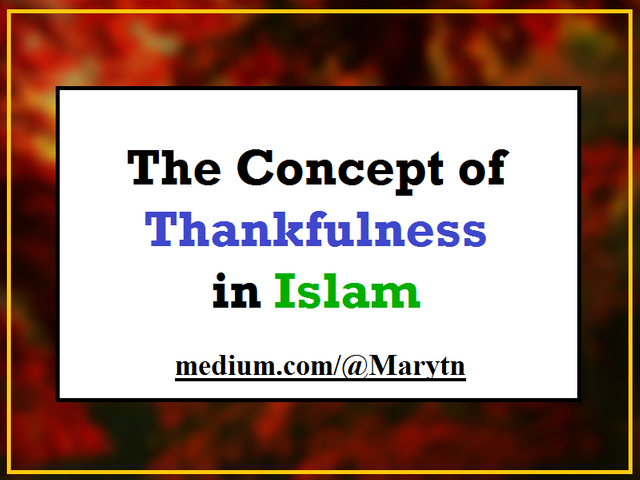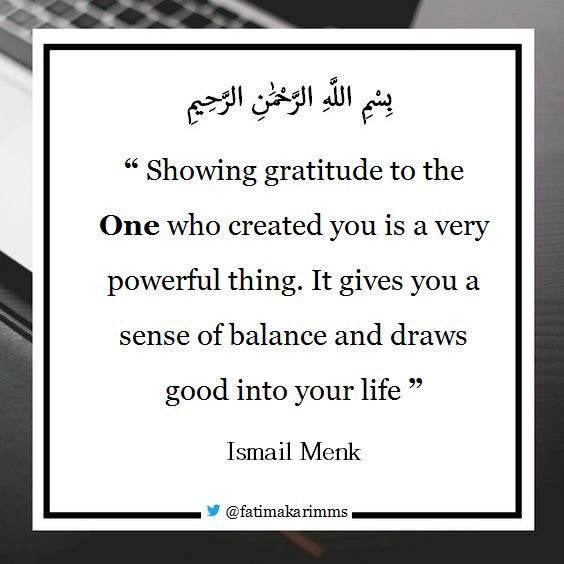The Concept of Thankfulness in Islam
The Concept of Thankfulness in Islam

God mentions thankfulness even before belief in Him
يَا أَيُّهَا الَّذِينَ آمَنُوا كُلُوا مِن طَيِّبَاتِ مَا رَزَقْنَاكُمْ وَاشْكُرُوا لِلَّهِ إِن كُنتُمْ إِيَّاهُ تَعْبُدُونَ
O you who believe! Eat of the good things We have provided for you, and give thanks to Allah, if it is Him that you serve
The Quran 2:172

Remember also the time when your Lord declared, If you are grateful, I will surely bestow more favours on you
The Quran 14:7
- ARE YOU GRATEFUL?
There is something in your life that you did not earn and do not own, yet it is given to you all the time.
This thing is this moment, and the next moment and all of the moments of your existence. There are no good reasons to show that you own these moments of your existence. You did not create the world and the life that it contains — including your own. Also, there are no good reasons to show that you have earned these moments, or that you deserve another moment in your life. Such a blessing can never be acquired or repaid by someone who doesn’t even have the power to create a single fly, and is a being that is dependent and needy.
Therefore, if someone has given you something that you haven’t earned and something that you don’t own, then that should instil an immense sense of gratitude in your heart. Who should you be grateful to? That’s simple. The One who created life and and gave it to you — God.
Gratitude in Islam is a form of worship. So do not be like the one who was given £100 pounds a day, and after a year he started thanking the £100 and not the One who gave it to him. Being ungrateful to God is irrational as well as a form of spiritual and intellectual malaise.
God reminds us,
( Truly, Allah is full of Bounty to mankind, but most of them are ungrateful )
The Qur’an 10:60
( And be grateful for the Graces of Allah, if it is He Whom you worship )
The Qur’an 16:114
According to Islam, one of our foremost duties is to be grateful to Allah/God for all of His blessings. We can describe three levels of thankfulness :
- To realize and appreciate all blessings by and within the heart.
- To say thanks with the tongue.
- To express gratitude by doing righteous deeds.
In other words, the first level is the appreciativeness and gratefulness that we feel in our hearts. Then we fortify that thankfulness through our speech. And the third level is when we prove by our deeds that we are truly thankful to God.
- Becoming more Thankful
As we open the Quran, the first chapter starts with ‘Alhamdulillah’ which is generally translated as “all praise is for God.” In reality, the word Alhamdulillah signifies gratitude in our everyday lives. Hence, when someone asks how we are, Muslim often respond with, “Alhamdulillah.” Similarly, Islam teaches us to be thankful throughout the day: for waking up from sleep, after eating our meals, drinking water, etc. In this way, one’s entire life revolves around gratitude to God.
In Chapter 55 of the Quran, titled “The Lord of Mercy,” God asks the same question thirty-one times, “Which of the favors of your Lord will you deny?” God has created us and then made this world for us. We are getting benefits from all of His creations such as the sun, moon, clouds, rain, air, grasslands, animals, plants, rivers, oceans and countless other bounties of the natural world! After realizing all this abundance, how can a sensible person be anything but thankful to God?
God reminds us,
“The seven heavens and the earth and all who dwell in them give glory to Him. There is not a single thing that is not chanting His praise yet you cannot understand their praise. He is ever forbearing, forgiving”
(Quran, 17:44).
Ironically, we humans are the only ones who forget to be grateful to Him. God ends the above verse by emphasizing that He is forgiving. It’s for this reason that we are not punished right away. Rather He gives us time to realize our mistakes and make amends.
Naturally, at times we may wonder whether it is truly beneficial to be grateful to God. In the Quran, God answers,
“If you are thankful I will add more (favors) unto you but if you show ingratitude then my punishment is terrible indeed” (Quran 14:7)
This verse proves that our gratitude is beneficial for us alone, and our ingratitude is harmful to us alone. The intelligent individuals who comprehend this basic teaching of Islam are referred to as those who are wise, who possess a mature and comprehending intellect.
- Examples of Gratitude from the Quran
God gives us an example in the Quran,
“We endowed Luqman with wisdom: ‘Be thankful to God: whoever gives thanks benefits his own soul, and as for those who are thankless — God is self-sufficient, worthy of all praise’” (Quran 31:12).
Luqman is recognized with the title of “The wise” just because he is thankful to God. Luqman recognizes that God is the one who grants everything so therefore He is the One who deserves thankfulness. May God give us wisdom to give thanks for all blessings by which we survive and thrive day after day.
Prophet Abraham describes God’s blessings in the most beautiful way:
“…Who created me, and He [it is who] guides me. And it is He who feeds me and gives me drink; and when I am ill, it is He who cures me; and who will cause me to die and then bring me to life; and who, I hope, will forgive me my faults on the Day of Judgment.” (Quran 26:78–85).
Another example if that of Solomon. The Quran mentions that he said,
My Lord, enable me to be grateful for Your favor which You have bestowed upon me and upon my parents and to do righteousness of which You approve. And admit me by Your mercy into [the ranks of] Your righteous servants (Quran 27:19)
In Chapter 4 of the Quran, God asks us a simple question:
“Why should God make you suffer torment if you are thankful and believe in Him? God always rewards gratitude and He knows everything”
(Quran, 4:147).
In this verse, God mentions thankfulness even before belief in Him. Similarly, the first chapter of the Quran gives us a lesson in gratitude and the second chapter, which is the longest chapter of the Quran, invites us towards belief in the One God. Therefore, gratefulness leads to the path of faith.
God loves us 70 times more than a mother loves her child, according to a tradition of Prophet Muhammad. God has also sent numerous prophets over the course of human history to guide us. (Click here to read about prophets in Islam.) Now it is up to us to be grateful and to have faith in Him — in our hearts, with our tongues, and through our actions.

source : https://medium.com/@Marytn/the-concept-of-thankfulness-in-islam-b16e9e40332a